Subtotal
$0
U.S. Shipping
FREE
Saved for Later
Shopping Cart
Subtotal
$0
U.S. Shipping
FREE
Saved for Later
Erin Hanson has been painting California desert scenes for almost two decades. As an Oregon native who transplanted to the California desert at a young age, Joshua trees and desert palms acted as childhood companions.
Unless one is actively immersed in a desert town like Palm Springs, La Quinta, or Indian Wells, one must seek out the dusty expanses that cover California's desert region. These desolate areas strike one as stark and monotonous. However, if one has Erin's eye, a desert dweller can see the vibrancy blossoming within.
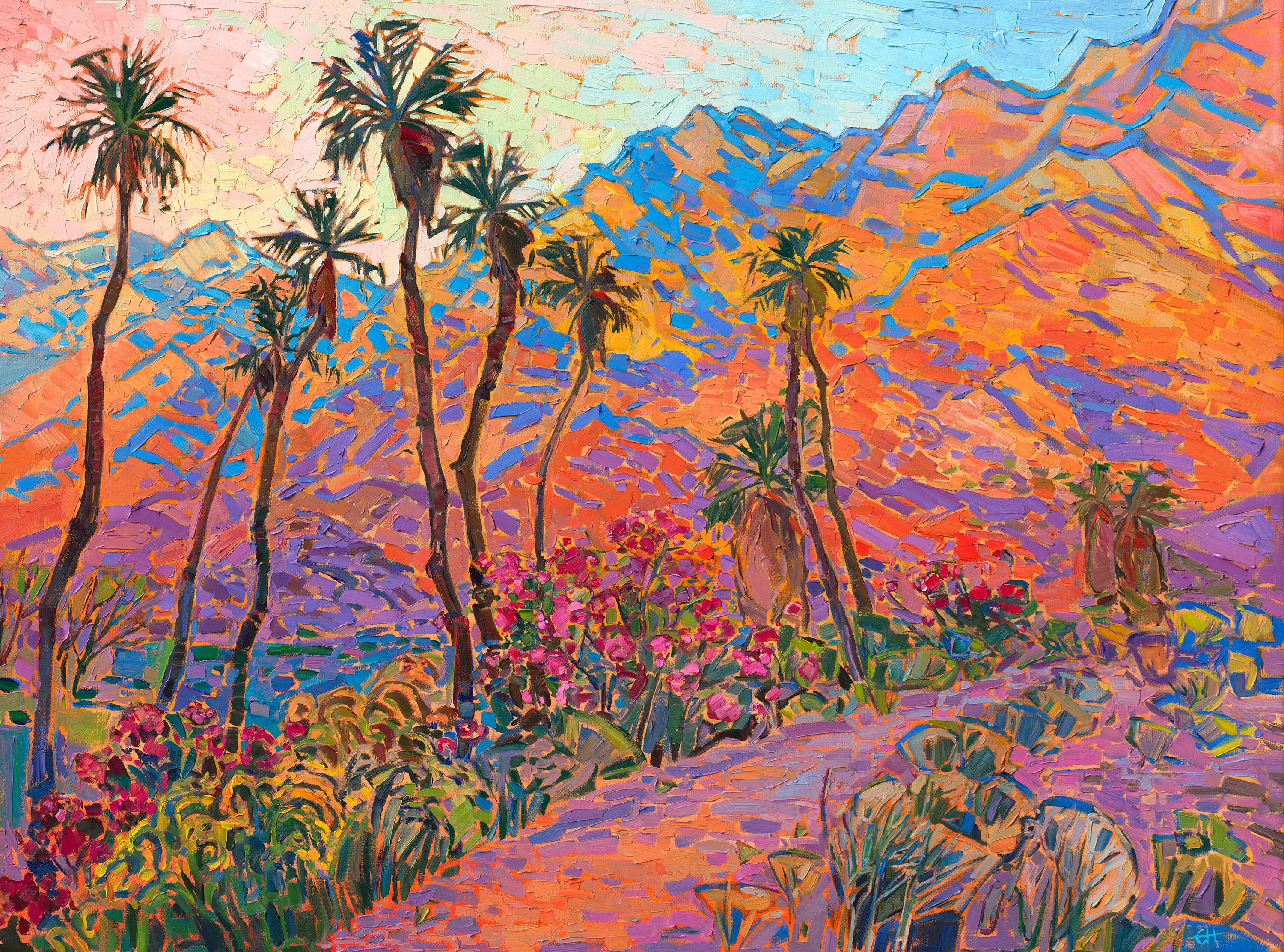
Desertscape by Erin Hanson, 2021
History of the California Desert
The recent history of California itself is fraught with resettlement, arguments about water rights, and enormous migrations of people - many coming from the midwest and American South during the Dust Bowl, others from Mexico, and still others from all over the world in hopes of fame and fortune. California is called the Golden State for many reasons. These include the actual gold found there, the golden color of California poppies, golden opportunities in Hollywood, and the incredible ability of the agricultural region to grow anything in its golden fields.
All of this lore and history includes the California deserts. However, this region is often looked over in favor of more densely populated locations like Los Angeles, San Francisco, and Sacramento.
Let's take some time to give the California deserts their due and dive into their history.
Long before the U.S. or Mexico owned California, Native American tribes lived in and around the California desert. These native tribes included Mojaves, Chemehuevis, Chumash, Costanoan, Quechans, and many others. At this time, the desert stretched much farther - through what is now the Imperial Valley.
The Spanish came to California in the 1700s. They began building the mission network, a series of religious buildings up and down California that introduced missionaries and colonists to the area. They also introduced disease to the native peoples, causing a series of epidemics among Native Americans. As with much of American history, disease was the main force that reduced the native population and allowed colonists to conquer and subsume them.
While American settlers had also come to California before the mid-1800s, it was the Mexican/American war beginning in 1846 and, subsequently, the Gold Rush in 1848 that brought them in force. They traveled across the desert or by sea to reach this land of gold. 1848 also marked the end of the Mexican/American war and the year that the U.S. acquired California.
During this time, many of the tribes that depended on the Colorado River for water and the California desert for minerals and other resources attempted to hold on to their land and water. However, the American onslaught overcame them, and settlers began to control the river and the surrounding land. This had the consequence of causing a significant change in the land itself. For example, settlers dug canals diverting water from the Colorado River to desert lands, creating new pastures and farmlands. They also brought water south from Owens River, across the Mojave Desert, to Los Angeles, draining those wetlands.
The changes wrought in the last three centuries shape much of today's desert. Before industrialized forces came to the California desert, the land's character had been relatively unchanged for centuries. After they arrived, the land and its people were forever altered.
Fortunately for all of us desert lovers, the state of California and the federal government have seen fit to protect many California deserts and monuments. This has allowed much of the native flora and fauna in those locations to grow without further development and has enabled many species to continue living in their native land.
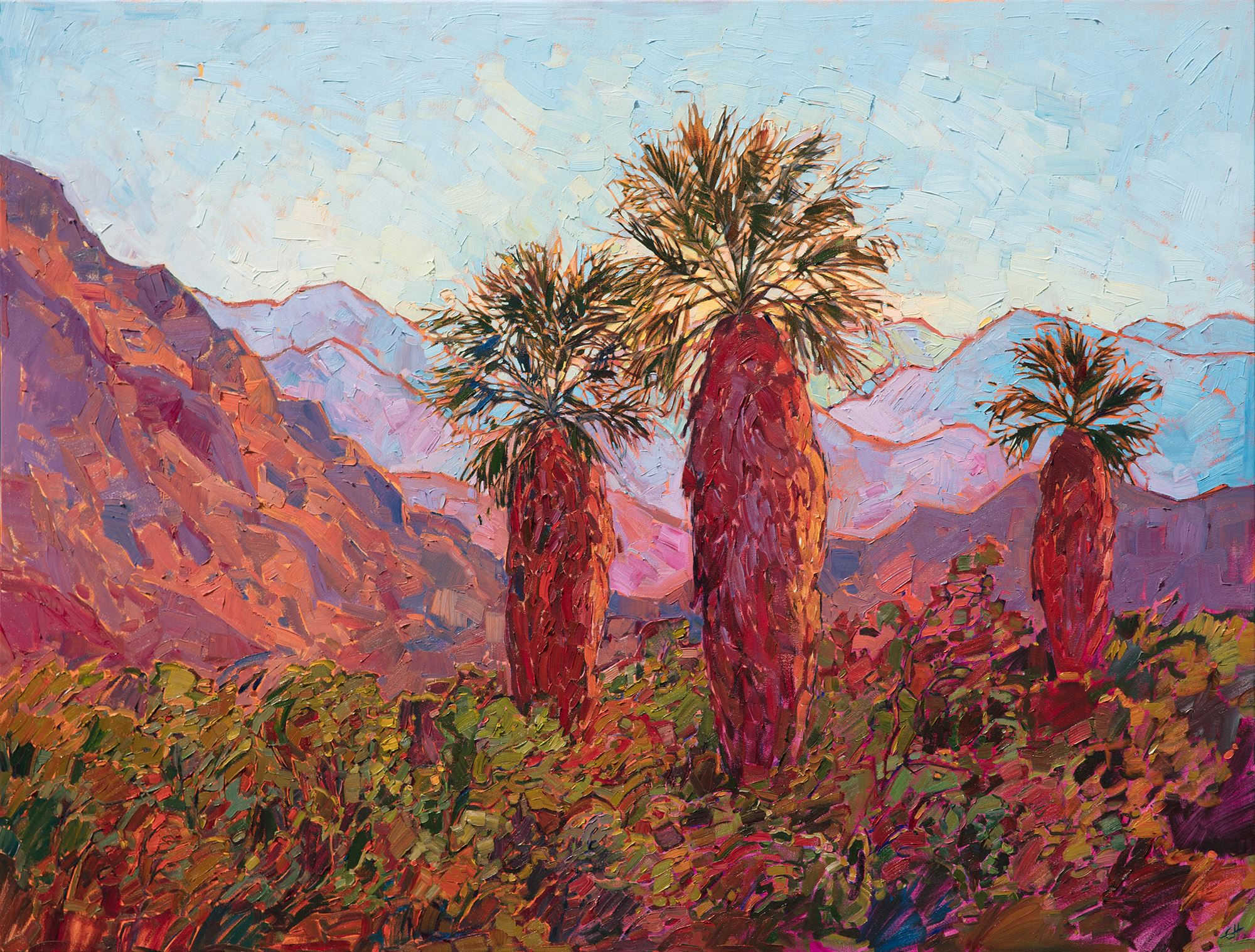
Palm Awakening by Erin Hanson, 2017
While Erin Hanson does not generally paint animals, her paintings capture much of the desert flora. While we usually think of "desert" as waves upon waves of dirt and sand, the California deserts are filled with life and beauty, as is the entire state. Historians believe these deserts were once verdant woodlands filled with shrubs and close-canopy vegetation. While that was over 15 million years ago, many plants and animals currently living in the California desert likely evolved from that time.
Here are some desert flora and fauna you can enjoy and perhaps take some time to ponder:
Ocotillo

Desert Blooms by Erin Hanson, 2022
Joshua Tree

Joshua in Light by Erin Hanson, 2014
Cholla Cactus

Cholla Blooms by Erin Hanson, 2018
Desert Marigold

Blooming Desert by Erin Hanson, 2019
Date palm

Painted Palms by Erin Hanson, 2023
California palm
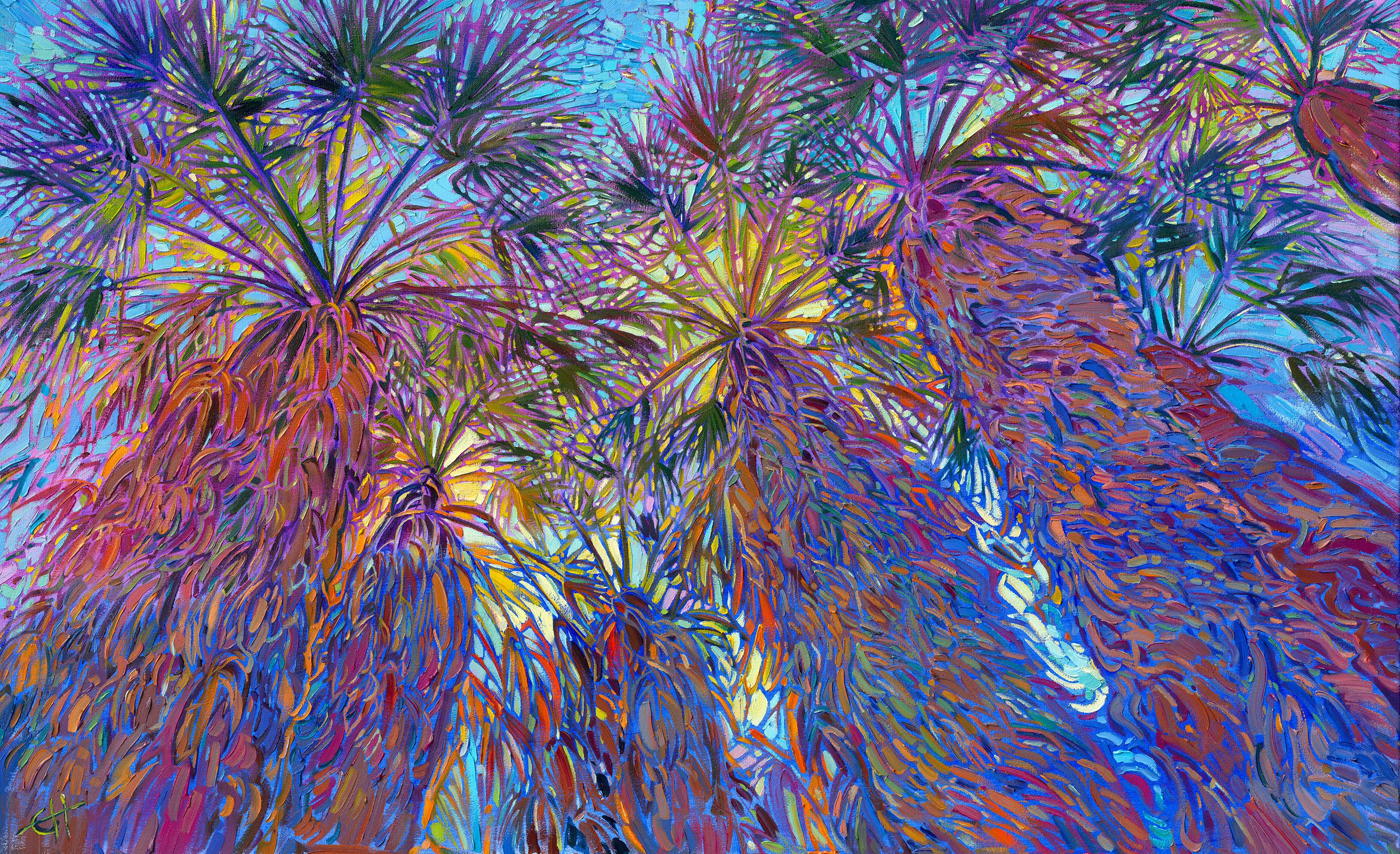
Palm Impressions by Erin Hanson, 2023
In addition to these beautiful plants, you may spot some of the native animals of California's desert. Some are endangered or rarely seen, while you can glimpse many others when embarking on a desert adventure. You may see:
Mojave Desert Tortoise
White-tailed Antelope Squirrel
Quail
Desert Banded Gecko
Flat-tailed Horned Lizard
Desert Iguana
Goldfinch
Western Meadowlark
Dusky Chipmunk
Pocket Gopher
Desert Black-tailed Jackrabbit
Mojave Fringe-toed Lizard
California Leaf-nosed Bat
Brown-headed Cowbird
California Mountain Lion
California Black Bear
Southern Mule Deer
Desert Bighorn Sheep
And many others
Hidden in the desert are various biodiverse and beautiful regions that anyone who enjoys southwestern art or desert art must visit.
Here are ten California deserts that you should be sure to experience:
Joshua Tree National Park
This part is named after the beautiful and distinctive Joshua tree, a member of the agave family. Visiting this park may feel like walking into a Dr. Seuss book, but it's actually 800,000 acres of rugged California desertscape.
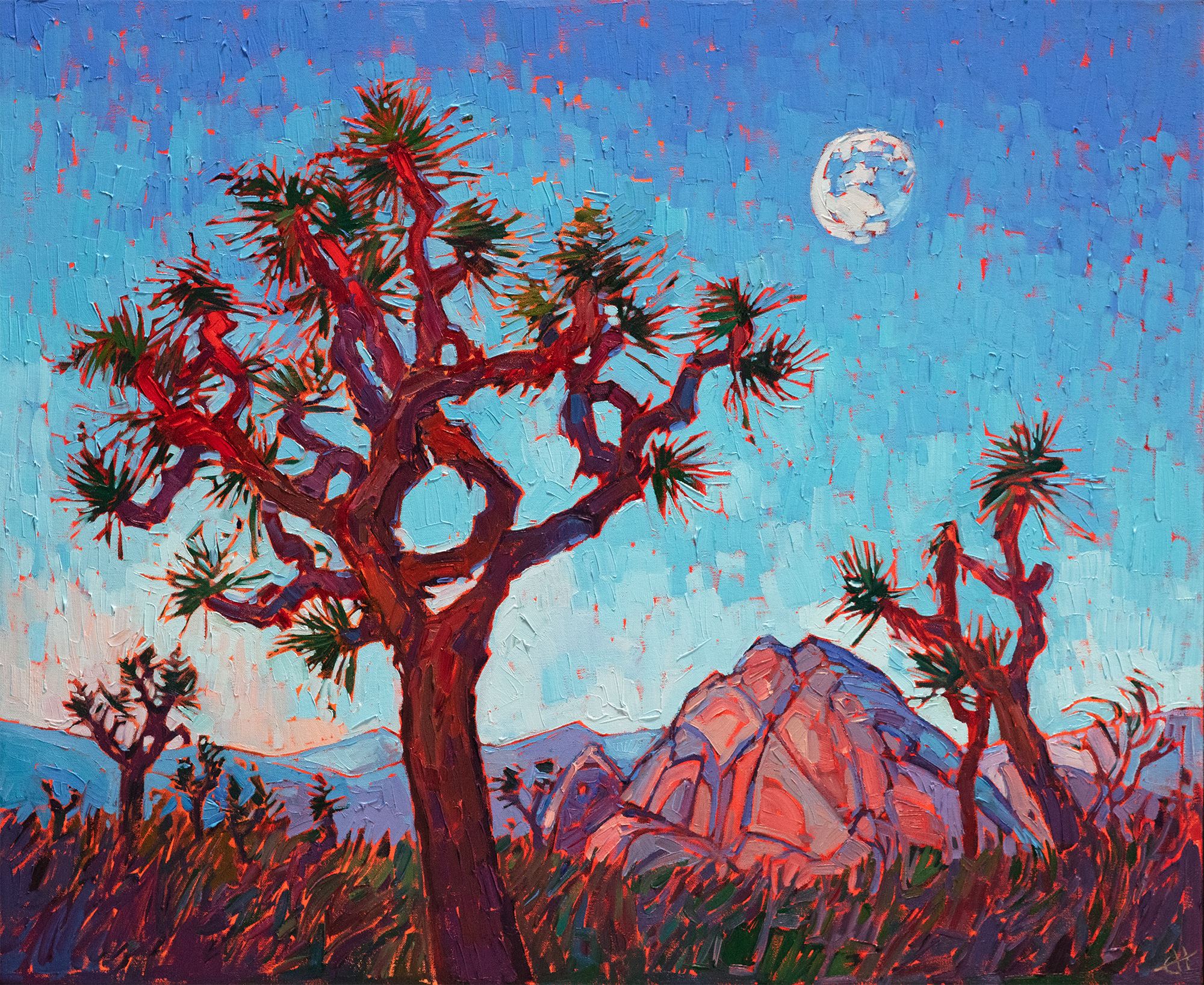
Joshua Moon II by Erin Hanson, 2020
Death Valley National Park
This park was accurately named. Death Valley is well known to be exceedingly dry and hot. Unique features include a salt crystal field, the lowest point along with the tallest dune in North America, and the hottest temperatures on the planet. Even though this valley appears unlivable to most, the Timbisha Shoshone tribe once called Death Valley home.

Desert Blues by Erin Hanson, 2013
Anza-Borrego Desert State Park
This beautiful state park is well-known for its gorgeous wildflower fields that bloom in the spring and the many scrub and cactus plants native to the area. Hiking and sightseeing in the region are popular, though most visitors prefer spring over the summer months due to the extreme heat.

Lemon Blooms by Erin Hanson, 2023
Red Rock Canyon State Park
Spectacular rock formations fill this incredible state park. Come here to view buttes, cliffs, and canyons.
Saddleback Butte State Park
Located on the western edge of the Mohave desert, this state park is known for springtime wildflowers, native Joshua Tree woodlands, beautiful rock formations, and much more.
Arthur B. Ripley Desert Woodland State Park
Preserving a large stand of native Joshua trees and junipers, this state park celebrates the beautiful flora and fauna of the area.
Mount San Jacinto State Park
This park is a fun and beautiful place to visit, featuring campgrounds and the Palm Springs Aerial Tramway.

Mountain Palms by Erin Hanson, 2018
Mojave National Preserve
Home to popular features like the Kelso Dunes and Rings Loop, the Mojave National Preserve is filled with remarkable geological features as well as desert flora and fauna.

Desert Brush by Erin Hanson, 2019
Rockview Nature Park
A hiking area in Victorville, CA, Rockview boasts campgrounds, an outdoor amphitheater, and plenty of classic desert features.
National Conservation Lands of the California Desert
This is a catch-all for any part of the California desert we left out in this article! There is so much beauty and diversity to be enjoyed in this part of the American Southwest.
California desert wildflowers are beautiful every year, but the desert experiences the perfect conditions for a California super bloom every decade or so. This is the period during which most of the annual native wildflowers bloom simultaneously.
There have been several super blooms since the turn of the century, in 2005, 2016, and 2023. Each has struck the viewers with wonder as the desert becomes blanketed with floral color.
Some of the beautiful flowers you may see during a super bloom include goldfields, blue dicks, fiddlenecks, poppies, great valley phacelia, hillside daisies, sand verbena, gravel ghost, chia, desert marigold, desert lily, desert sunflower, apricot mallow, woody aster, and blooming cacti.

Super Bloom by Erin Hanson, 2017

Borrego in Spring by Erin Hanson, 2023
The California desert has inspired artists across time and ethnicities.
Native American artists have been creating art utilizing natural materials found in the California desert for centuries. Native art forms include basket weaving, sculpture, petroglyphs, and, in more recent times, photography and painting.
The California desert region has also inspired other American artists and artists from all over the world. These artists include Edward Harvey Davis, Effie Anderson Smith, Blanche Dougan Cole, Guadalupe Alberas, Ansel Adams, and Frederick Richard Chisnall.

Near Death Valley by Ansel Adams
Erin Hanson is not immune to the lure of the California desert, as you can see in her many paintings depicting this beautiful part of the U.S.

Purple Scrub by Erin Hanson, 2007

Brooding Storm II by Erin Hanson, 2012

Dance of the Sagebrush by Erin Hanson, 2013

Desert Paintbrushes by Erin Hanson, 2018

Ocotillo Dawn by Erin Hanson, 2017

Oasis Sky by Erin Hanson, 2022
Erin Hanson's open impressionist artwork, along with the desert art of artists of all styles and disciplines, can be seen around the state in museums like the Hilbert Museum of California Art, the Santa Paula Art Museum, the Museum of Modern Art, Palm Springs Art Museum, and the Getty Art Museum.
Art enthusiasts can also enjoy work inspired by the California desert by visiting art festivals such as La Quinta Art Celebration, The Southwest Arts Festival, Palm Springs Fine Art Fair, and others.
Do you love Erin Hanson's art? Explore Erin Hanson's California desert artwork and her other open impressionist works here.
Resources:
https://nahc.ca.gov/native-americans/california-indian-history/
https://www.nps.gov/articles/beyond-the-surface-national-recognition-of-the-california-desert.htm
https://www.californiadesertart.com/
https://www.laquintaartcelebration.org/
https://gcvcc.org/event/southwest-arts-festival/
https://www.washingtonpost.com/climate-environment/interactive/2023/california-super-bloom/
https://www.nationalparks.org/explore/parks/joshua-tree-national-park
https://morethanjustparks.com/death-valley-national-park-facts/
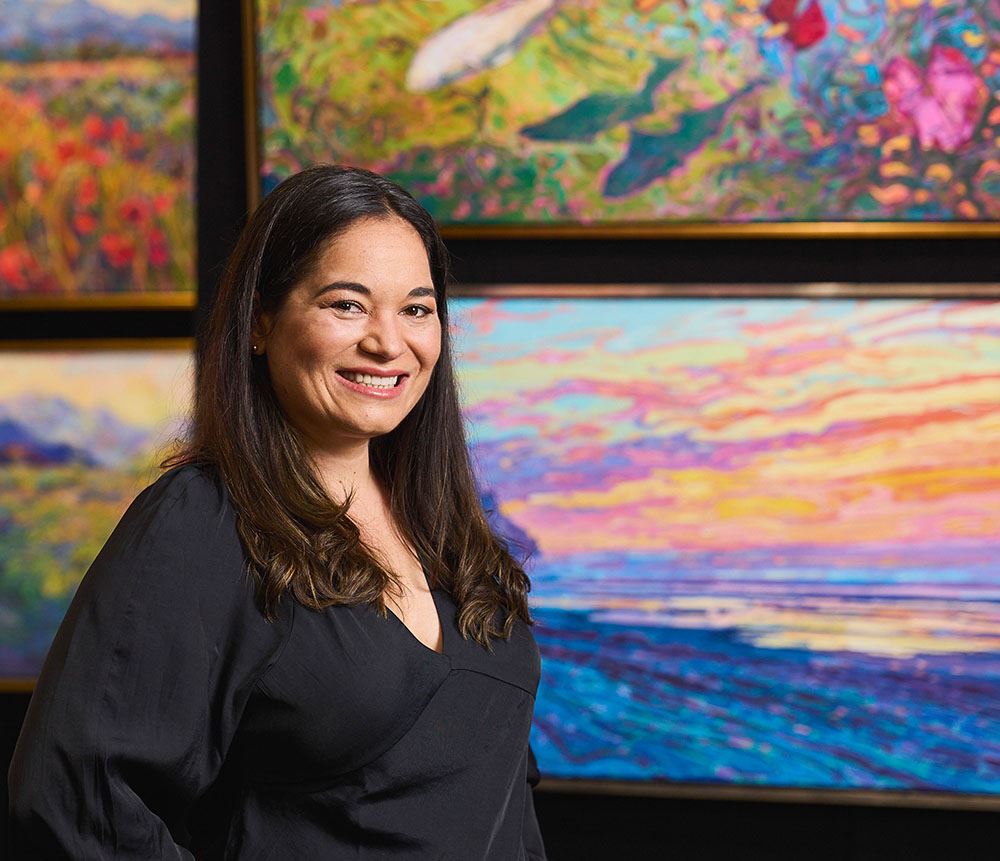
About Erin
ERIN HANSON has been painting in oils since she was 8 years old. As a teenager, she apprenticed at a mural studio where she worked on 40-foot-long paintings while selling art commissions on the side. After being told it was too hard to make a living as an artist, she got her degree in Bioengineering from UC Berkeley. Afterward, Erin became a rock climber at Red Rock Canyon, Nevada. Inspired by the colorful scenery she was climbing, she decided to return to her love of painting and create one new painting every week.
She has stuck to that decision, becoming one of the most prolific artists in history, with over 3,000 oil paintings sold to eager collectors. Erin Hanson’s style is known as "Open Impressionism" and is taught in art schools worldwide. With millions of followers, Hanson has become an iconic, driving force in the rebirth of impressionism, inspiring thousands of other artists to pick up the brush.